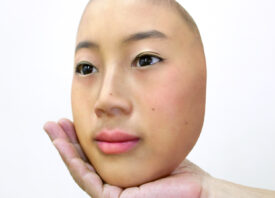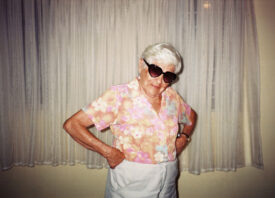Search this site
The 13-Year-Old Pageant Girl Who’s Challenging Racism in Brazil

Luana, Maysa’s sister, decided she also wants be a model.

Sunday morning, after buying bread for breakfast.
“Maysa is proud of her skin, her beauty, her African hair,” Brazilian photographer Luisa Dorr says of her thirteen-year-old muse and close friend, whom she has documented for the last two years. The photographer remembers vividly meeting the girl, then eleven, at Palacio do Cedro during the Young Miss Brazil pageant. She wore a green dress and dreamt someday of being in the competition herself.
Dorr never forgot meeting Maysa and hearing about her goals, and when her mother reached out to her months later, the artist jumped at the chance to photograph her again. After that first session, the family welcomed the photographer into their house in Brasilandia in Sao Paulo. Life in the area isn’t easy, and Maysa’s mother works hard to make ends meet.
Six months passed, and Maysa entered the pageant world; she took home the Young Miss São Paulo “Black Beauty” title, reserved for girls of color. She was set to go on from the state pageant to the national competition, but the organizers bailed, and Maysa was not able to continue. Maysa’s mother is currently involved in a legal case against Young Miss Brazil.
Still, Maysa pursues her modeling career. She studies hard throughout the week, and she devotes her day off on Sunday to training for the runway. In Dorr’s words, it is “the day of beauty” for both Maysa and her sister, who is following in her footsteps.
The family was always generous with Dorr, though it did take time for them to fully invite her into the fabric of daily life. Over the last years, however, she has become “part of the family.” She feels like an older sister to Maysa, and they have talked candidly about racism.
More than anything, Dorr admires Maysa’s extraordinary tenacity and will to thrive. Just barely a teenager, she is already paving the way for other girls like her. The photographer reports, “In Brazil, I can count on my hands the times that I see Black people in the cinema,” but Maysa is challenging that.
“She knows where she comes from, and that makes her stronger,” Dorr explains. She hopes someday Maysa will be discovered and launch her career. Regardless of her future, though, the artist knows she’ll continue to forge her own way–and open doors for others in the process.

Maysa playing her mother’s veil in the garden

The first photo I took of Maysa.


Maysa’s neighborhood, Brasilandia, is a dangerous slum on the outskirts of Sao Paulo.

Maysa wears her mother’s wedding dress.

Brasiladia, Sao Paulo, Brazil.

Maysa’s birthday.

Maysa’s favorite movies.

Being a “Miss” goes far beyond talent; it is a way for these young girls to survive their environment. As with many young women from the disadvantaged communities of Sao Paulo, they face poverty, violence, racism, trauma, and a range of other barriers to both health and well-being.

The moment when Maysa won the title for Young Miss Sao Paulo.

Before the semi-final contest for Young Miss Sao Paulo 2015.

Brasilandia, Sao Paulo, Brazil.

Maysa and her friends.

Maysa prays before her turn on stage during the final contest for Miss Sao Paulo 2015.
All images © Luisa Dorr



